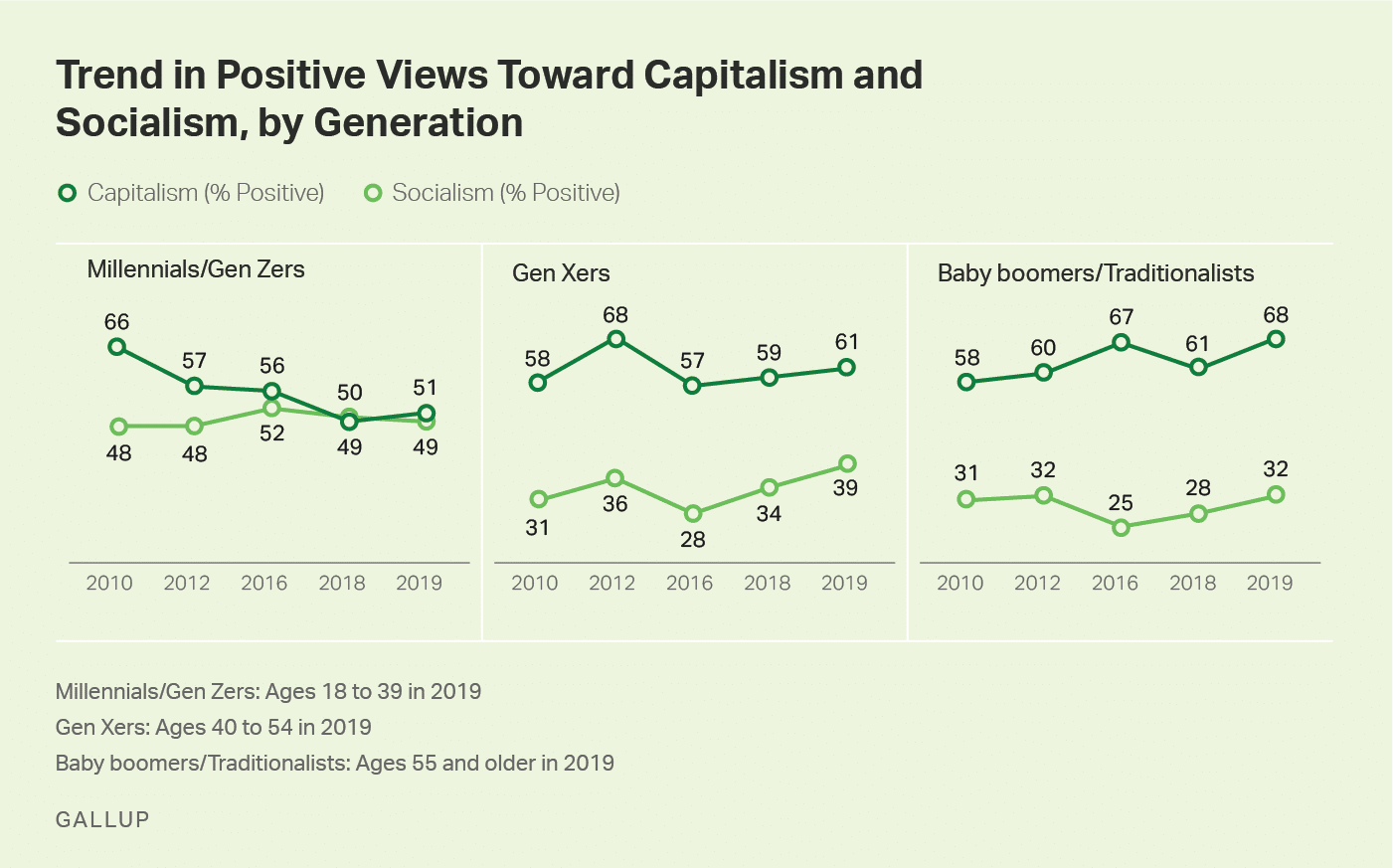The “American Dream” is dead.
It would certainly seem to be the case if you believe surveys like Gallup that showed nearly 50% of the younger generation favor socialism over capitalism. To wit:
“Since 2010, young adults’ positive ratings of socialism have hovered near 50%, while the rate has been consistently near 34% for Gen Xers and near 30% for baby boomers/traditionalists.”
Or, a more recent WSJ poll conducted by the NORC at the University of Chicago found that only 36% of Americans still believe in the “American Dream.”
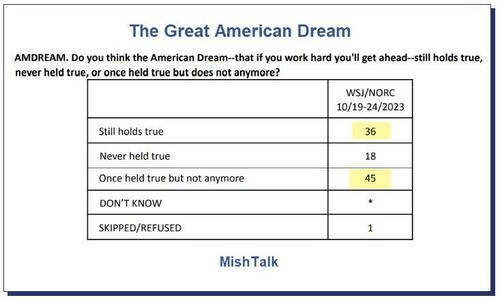
But such a dire sentiment should be surprising given the increasing disparity between socio-economic classes. The recent struggles with the pandemic-era driven shutdown, then rising inflation, and spiraling housing costs are certainly reasons that many would believe the “American Dream” is dead.
However, the pessimism about capitalism in the U.S. has been brewing since the “Financial Crisis.” Its early forms started with “Occupy Wall Street” following the subprime crisis and continued growing as political divisions deepened. The rise of civil unrest has deeper roots, as noted by Pew Research in 2017:
“The U.S. economy is in much better shape now than it was in the aftermath of the Great Recession…But by some measures, the country faces serious economic challenges: A steady hollowing of the middle class and income inequality reached its highest point since 1928.”
If you look at the faces of those pushing back, they are of every race, religion, and creed. Their commonality is they are the demographic most impacted by job losses, income destruction, financial disparity, and debt. That inequality gained enormous traction following the Federal Reserve’s repeated bailouts of the financial system. Today, the top 10% of income earners own roughly 88% of financial assets.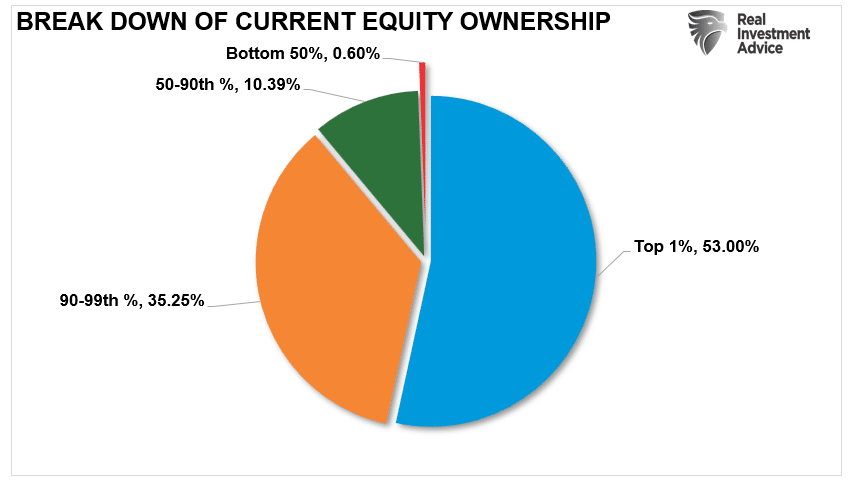
More notably, total household net worth has only marginally increased for the bottom 50% of Americans since the turn of the century.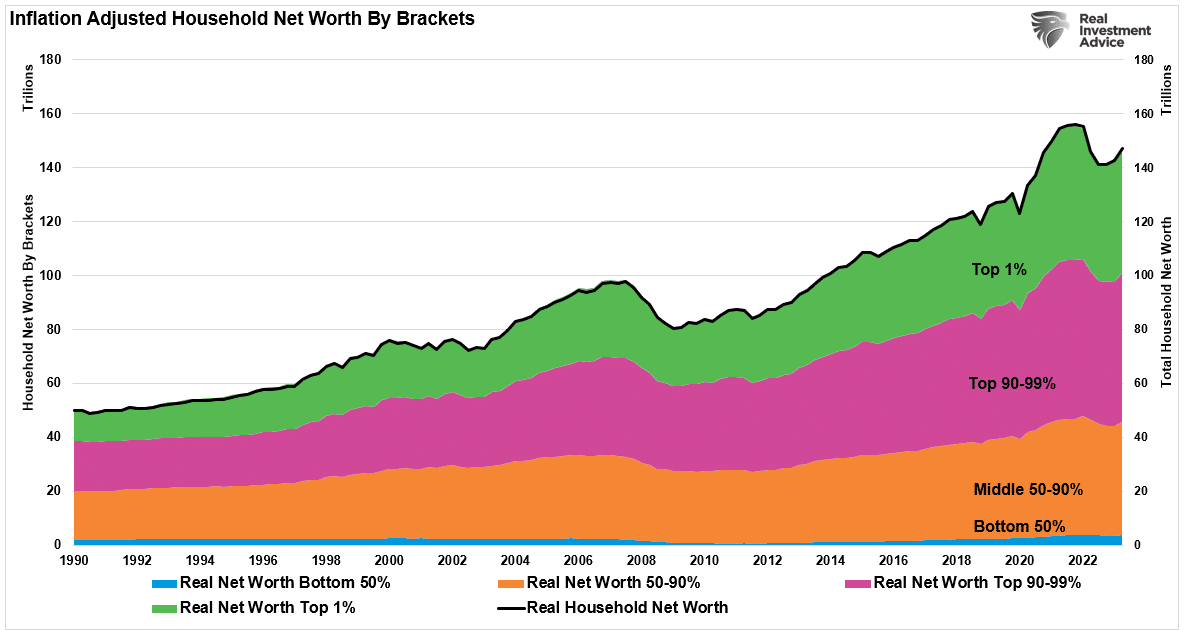
As the “rich” got richer, the masses noticed their economic prospects failed to improve. It should be of no surprise that those most disenfranchised eventually started to push back, demanding more support from the Government.
However, what the media proclaims to be the “American Dream” and what is in “reality” are two very different things.
What The American Dream Is And Isn’t
The media disparages the “American Dream” based on the ability to buy a home, minimum wages, or healthcare costs.
This is entirely wrong.
The “American Dream” is the idea that the Government should protect each person’s opportunity to pursue their vision of happiness. It is the dream of opportunity, the dream of freedom, and the dream of liberty.
That dream was penned in the Declaration Of Independence:
“We hold these truths to be self- evident, that all men are created equal, that they are endowed by their Creator with certain unalienable Rights, that among these are Life, Liberty and the pursuit of Happiness.”
The founders of this nation NEVER penned that American citizens had the RIGHT to a house, free health care, or government welfare.
As Kimberly Amadeo previously penned:
“The Founding Fathers put into law the revolutionary idea that each person’s desire to pursue happiness was not just self-indulgence. It was a part of what drives ambition and creativity. By legally protecting these values, the Founding Fathers set up a society that was very attractive for those aspiring to a better life.”
Or, as James Truslow Adams quoted in his book “Epic Of America:”
“The American Dream is that dream of a land in which life should be better and richer and fuller for everyone, with opportunity for each according to ability or achievement. The American Dream is NOT a dream of motor cars and high wages merely, but a dream of social order in which each man and each woman shall be able to attain to the fullest stature of which they are innately capable, and be recognized by others for what they are, regardless of the fortuitous circumstances of birth or position.”
So, precisely what is the “American dream?”
It’s Up To You
The “American dream” is about the opportunity to achieve a result, not the result itself. Many of the younger generation today feel as if the ability to achieve success is out of reach. According to a 2020 YouGov poll:
“A poll of more than 14,000 people finds that just over half (54%) of US adults think the American Dream is attainable for them. About 3-in-10 (28%) believe it’s unattainable for them personally, while 9 percent reject the idea of the American Dream entirely.”
The American dream was never about being granted a high salary, given an opportunity, or gifted wealth. However, we were given the “freedom” to start with nothing and, by sheer “will,” create success. For example:
- Jan Koum, CEO and Founder Of WhatsApp, once lived on food stamps.
- Kenny Troutt, the founder of Excel Communications, paid his way through college selling life insurance.
- Howard Schultz grew up in a housing complex for the poor.
- Investor Ken Langone’s parents worked as plumbers and cafeteria workers.
- Oprah Winfrey was born into poverty.
- Billionaire Shahid Kahn washed dishes for $1.20 an hour.
- Kirk Kerkorian dropped out of school in the 8th grade to be a boxer.
- John Paul DeJoria, the founder of Paul Mitchell, once lived in a foster home and out of his car.
- Do Won Chang, founder of Forever 21, worked as a janitor and a gas station attendant when he first moved to America.
- Ralph Lauren (NYSE:RL) was a clerk at Brooks Brothers.
- Francois Pinault quit high school in 1974 after being bullied because he was so poor.
There are millions more like them. The only difference between them and those complaining about the “American Dream” is they had the drive to work, the willingness to sacrifice, and the courage to reach for it.
Capitalism Is Not Perfect
One thing is for sure. Capitalism is not perfect.
“Capitalism is an imperfect economic system, because differential performance in the pursuit of economic success, as well as luck, results in there being (a) some people who are less successful as well as some who are more and (b) a few who are glaringly successful.’
Obviously, I’m someone who has profited from capitalism, so my views could be dismissed as hopelessly biased.
However, I’m 100% convinced that the capitalist system has produced the most aggregate gains for our society, exceptional overall progress, and a better life for most. For me, the best assessment of capitalism is the one Winston Churchill applied to democracy:
No one pretends that democracy is perfect or all-wise. Indeed, it has been said that democracy is the worst form of Government except all those other forms that have been tried from time to time.
In the same way, I’m convinced that capitalism is the worst economic system; except for all the rest.” – Howard Marks
Due to 50 years of debt, deficits, and ongoing interventions in the financial system, there is a visible gap between the “rich” and everyone else. However, that is not a failure of “capitalism;” it is the byproduct of “corporatism.”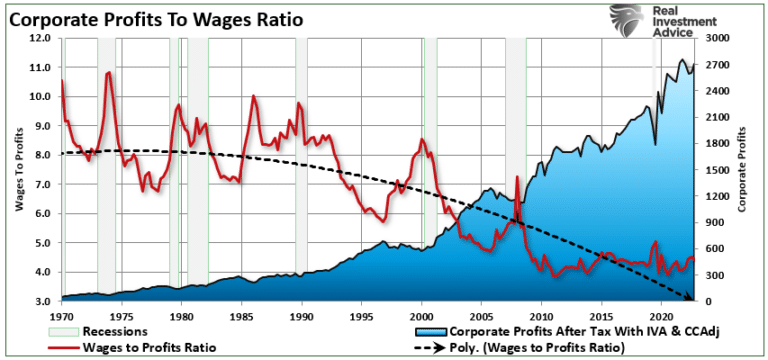
Capitalism is the only system that will allow you to achieve unbridled success.
Yes, the Government can pay for anything you want. We tried that in 2020. The result was a massive spike in inflation, ultimately putting those receiving the benefits in a worse financial condition.
The other problem with “free money” is that requires those who are succeeding to pay for it.
Think about it.
Do you want to work hard, sacrifice, and take on an exceeding amount of risk to achieve success, only to pay for those who don’t?
Such is why socialism always fails.
“The greater good can only be achieved by making the good greater.” – Daniel LaCalle
10 Steps To Achieve Your “American Dream.”
Let me clarify the issue for you.
“The ‘American Dream’ isn’t going into debt to buy a home. The ‘American Dream’ is the ability for ANY person, regardless of race, religion, or means, to achieve success, and in many cases great success, through hard work, dedication, determination, and sacrifice.“
In other words, anyone can succeed through hard work, dedication, determination, and sacrifice.
I know. It sounds hard. And it is.
Those who achieve success aren’t whiners and don’t blame others for their failings.
They DO SOMETHING about it.
The difference between success and failure is the “will to keep going.”
Therefore:
- Be accountable for your current situation. Blaming others only keeps you from taking steps to fix it.
- Your life depends on it, literally. If you don’t take control of your life, it will take control of you.
- Control your circumstances. Put yourself in a position to control what happens around you.
- You have to REALLY want it. If you aren’t committed, you are going to fail.
- Be bold. No one will take you seriously unless you take yourself seriously first.
- Find a guide. In business, find a mentor to guide you through the wilderness.
- Are you a “renter” or an “owner?” “Renters” can walk away without consequence. “Owners” have too much at stake to lose. Be willing to commit to everything. If you have no choice BUT to succeed, you will.
- Be willing to work. Success is not a weekday 9-5 job. It is a 24-7 adventure that will consume your life. If you aren’t willing to “do the time,” don’t start.
- You probably need to get rid of your current friends. If you want to know where you will be in 5 years, look at who you surround yourself with today. Successful people surround themselves with successful people.
- Get off of social media. If you want to succeed, get out into the real world and find the opportunities overlooked by others.
The “American Dream” isn’t dead, at least not yet.
But you must decide to take the first step.

